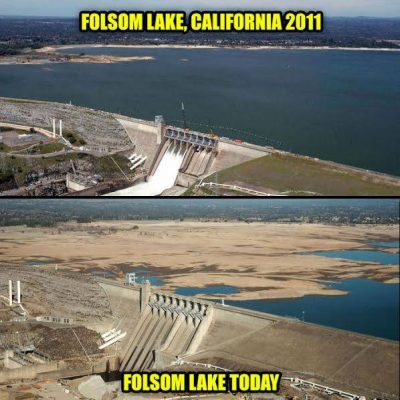ECHO LAKE, CALIFORNIA (TIP): California governor Jerry Brown ordered officials April 1 to impose statewide mandatory water restrictions for the first time in history as surveyors found the lowest snow level in the Sierra Nevada snowpack in 65 years of record-keeping.
Standing in dry, brown grass at a site that normally would be snow-covered this time of year, Brown announced he had signed an executive order requiring the State Water Resources Control Board to implement measures in cities and towns to cut the state’s overall water usage by 25 percent compared with 2013 levels.
The move will affect residents, businesses, farmers and other users.
”We’re in a historic drought and that demands unprecedented action,” Brown said at a news conference at Echo Summit in the Sierra Nevada, where state water officials found no snow on the ground for the first time in their April manual survey of the snowpack. ”We have to pull together and save water in every way we can.”
After declaring a drought emergency in January 2014, Brown urged all Californians to cut water use by 20 percent from the previous year. Despite increasingly stringent regulations imposed on local water agencies by the state, overall water use has fallen by just half that amount, prompting Brown to order the stronger action by the water board.
”We’re in a new era; the idea of your nice little green grass getting water every day, that’s going to be a thing of the past,” Brown said.
The executive order will require campuses, golf courses, cemeteries and other large landscapes to significantly cut water use; direct local governments to replace 50 million square feet (4.65 million sq. meters) of lawns with drought-tolerant landscaping; and create a temporary rebate program for consumers who replace old water-sucking appliances with more efficient ones.
It calls on local water agencies to be more aggressive in charging for high water use, including extra fees for the highest water consumption.
The snow survey on Wednesday showed the statewide snowpack is equivalent to 5 percent of the historical average for April 1 and the lowest for that date since the state began record-keeping in 1950.
Snow supplies about a third of the state’s water, and a lower snowpack means less water in California reservoirs to meet demand in summer and fall.
Critics of the Democratic governor said his order does not go far enough to address agriculture — the biggest water user in California.
The order contains no water reduction target for farmers, who have let thousands of acres go fallow as the state and federal government slashed water deliveries from reservoirs. Instead, it requires many agricultural water suppliers to submit detailed drought management plans that include how much water they have and what they’re doing to scale back.
In the past year, the state water board has imposed mandatory water-saving restrictions on urban users that prohibit sprinklers running off onto pavement, bans residents from watering lawns two days after rain, and bars restaurants from serving water unless customers ask for it.
